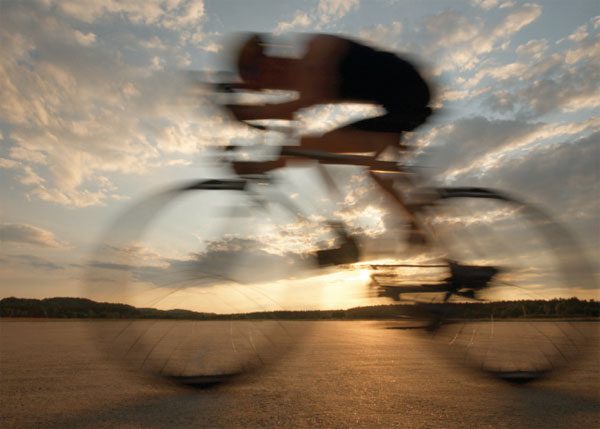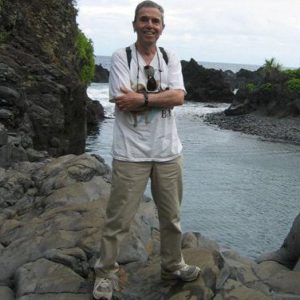
Like running a successful organization, excelling in extreme sports requires focus and drive. Participants must also stay in top physical form, maintain a rigorous training schedule and make spilt-second decisions at moments of risk. You cannot dabble in this. The CEOs who practice them say that their sports keep them mentally alert, bring business lessons and build confidence: Conquering a mountain also helps conquer self-doubt.
Never Too Busy for a Triathlon
Willy Walker runs in last year’s Washington, D.C., triathlon.
Willy Walker is CEO of Walker & Dunlop and chairman of both the DC Water and Sewer Authority and Sweden-based Transcom WorldWide. He nevertheless finds time to compete in international distance triathlons and to train for them almost daily. “I’m a pretty competitive guy,” he says. “If I miss training a couple of days, which is very rare, I get grumpy and lose focus.”
Walker began competing in triathlons in 2008 at the suggestion of D.C. Mayor Adrian Fenty, a friend. In last year’s D.C. triathlon, held in near-100 degree weather, he finished 32 out of 5,000-plus racers, or second in his age group. In the Boston Marathon he clocked two hours, 36 minutes.
“Lots of CEOs complain about being busy and not being able to exercise. That’s no excuse,” he says.
Into Thin Air
John Rost on Mt. Everest.
John Rost, founder and president of Fiesta Franchise Corporation, has scaled the highest mountains on seven continents, or the seven summits. Only the 35th American to have done this, he also has trekked to both poles, sailed around the world, ran a marathon and earned two world speed records for fastest flight in class in an experimental RV10 aircraft that he built from a kit in his garage.
Spending eight weeks climbing one of the world’s highest peaks is more a mental challenge than a physical one, he says. He ran his marathon across the Great Wall in China without any preparation. “I just showed up and completed the task,” he comments.
His next adventure will be a camel ride across Morocco, Algeria, Libya and Egypt, traveling “along ancient trails, just as it has been done for thousands of years.”
Skiing Unforgiving Slopes
CEO Josh Williams of Gowalla snowboards in Park City, Utah.
Extreme skiing is done off-trail on virgin snow along slopes as steep as 60 degrees, sometimes in dangerous terrain. This does not faze Josh Williams, CEO of Gowalla, who also skis and snow-boards in more relaxed settings.
“Beyond my family, there is little that will bring as wide a smile to my face as hiking up a ridge as the sun is rising in order to grab first tracks in fresh powder,” he comments. “If I wasn’t hustling a startup, I’d probably be a ski bum.”
Bring on the Body-Slamming
Ryan Hodson, playing flanker, awaits a kick from the opposing team in a Las Vegas game.
Brutal and often bloody, played without pads or helmets, rugby is the rough cousin of American football. Ryan Hodson, managing director at Kodiak Capital Group, has played rugby most of his life. He helped organize the new USA Rugby League, which began its first games in May. The teams play rugby league, the faster and more arduous of the two forms of rugby (the other being rugby union).
Kodiak employees play with several of the new teams and the sport is embedded in the firm’s culture. “We look at players who have a strong desire to play league as well as a strong desire to gain experience in finance,” Hodson says. The firm has “a work-hard, play-hard attitude and ethos,” he adds. “While other financial groups play softball or run races, Kodiak is hard-mouth from 9 to 5 and from 5 to 9.”
Orienteering: Beyond Marathons
Phil Martineau punches in at Point 5 of 12 in a 7km orienteering course in Western Pennsylvania.
Orienteering, one of the lesser-known extreme sports, is a race through unfamiliar terrain using a map and compass. Among the sport’s enthusiasts is Phil Martineau, CEO of Pittsburgh Corning Corporation.
The sport requires endurance and solving problems like, “Do I go over or around the mountain,” Martineau says. “The mental concentration and challenge is completely engrossing. Definitely a sport that draws Type A individuals.” Experience and cunning can offset youth and enthusiasm, according to Martineau, who is 63. It is experience that can tell you when lost whether to keep going or go back.
Over the past 33 years he has run in events all over the world and in extremes in terrain and weather. Martineau crossed a snow-melt bog that looked shallow but became chest-deep near the other side. He encountered 95-degree heat and six hours of intense rain. He has competed in events lasting 14 hours, in night orienteering and on skis in double-digit sub-zero wind chill.
When he dislocated some ribs during a fall at a national meet, his doctor said that he had never checked off the “Fall from Cliff” diagnosis code on a form before. Martineau has gotten his whole family involved in the sport and took one of his daughters orienteering at age three in his backpack.
Martineau also pursues more traditional ways of testing endurance. He completed five marathons in the last two years and ran in triathlons in the past but says, “after about 15 or so I got bored.” Nevertheless, after watching that same daughter finish second in an Ironman last year he is considering training for another.
A Need for Speed
Kate Kohler prepares for swim race at Augusta Half Ironman in 2010.
Kate Kohler, a former U.S. Army captain who is COO of the Pentagon Federal Credit Union Foundation, has completed seven half-Ironman triathlons and four marathons.
She also climbed Mt. Kilimanjaro. Kohler began swimming competitively when she was eight years old and completed her first triathlon when she was 16. At West Point, she joined the triathlon team because she could bike and run off post, a huge liberty for a cadet. She graduated first in her class in physical fitness.
“While I am training and racing, I get a sense of calmness,” she says. “I can tune into my breathing and quiet my thoughts. Many times it is while running or swimming when I actually have business breakthroughs or capture an insight… By 7 a.m. you have a sense of accomplishment that you carry with you all day.”
Last year she completed the Augusta Half Ironman at 5:27, faster than her college rate. “I am fired up about racing faster in the next 20 years,” she says.
Joy on Mountaintops and Under Water
Rick Davidson pauses on the Ingraham glacier on a climb on Mt. Rainier in Washington.
Century 21 Real Estate CEO Rick Davidson pursues adventure in many forms. They include mountain climbing, skydiving, scuba diving, NASCAR racing and jet fighter flying. Mountain climbing helps teach him how to push through mental and physical challenges to meet ambitious goals, he says. He views it as the ultimate team sport because “your teammates are your life.”
All-Terrain Motorcycle Racing
Will Travis on his BMW 1200 GS Adventure motorcycle at the 2011 Dakar Rally.
The Dakar Rally, a 12-day, 3,500-mile motorcycle race that is among the world’s most arduous, crosses the mountains, sand dunes and deserts of the South American Andes. Will Travis, who until April of this year was CEO of Dentsu America, competed in the 2011 event on a BMW 1200 GS Adventure bike.
At one point, he had to ride four hours in the dark at two degrees below zero with 70 mph winds howling because of customs delays at a 15,000-foot-high border point between Argentina and Chile.
Writing one night on his blog, he reported that he had hit sand pits four feet deep and 100 yards long. “The bike thrashed side to side like a writhing snake and my training of loosening my grip, leaning back and just riding quickly to skim the surface proved critical,” he noted.
It took six months to prepare his 18-person support team, which included two women and traveled 400 miles ahead. Three members collapsed from lack of oxygen. Other bikes crashed, two of them into each other, but Travis made it to the finish line. He also has scaled two of mountaineering’s seven summits, Vinson Massif in Antarctica and Elbrus in Russia.
CEO Challenges: CEOs vs. CEOs
Chief executives compete in the marketplace—and against each other in triathlons and extreme biking races. Over the past four years, more than 350 have taken part in events hosted by CEO Challenges, some as many as five times. The events, which take as long as four days, often are attended by the participants’ families.
There is spirited competition but also camaraderie. When the contest is over, the executives kick back and share peer-level congratulations or commiseration, depending on how each finished.







